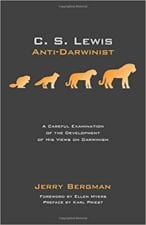My choice for this month’s book is C.S. Lewis Anti-Darwinist by Jerry Bergman, and I commend it to you as an outstanding resource. I have read a lot in Lewis, and I have read a lot about Lewis, and this book really crystallized many issues for me. The editing of this book is choppy at places, but the citations and basic points are golden.
One of the things that is distressing to conservative Christians who appreciate the weight of Lewis’ contributions to a robust defense of the Christian faith is the fact that Lewis was apparently at peace with theistic evolution. Given how far down that road we now are, this appears to many to be a fatal deficiency in Lewis. His accommodation of evolution appears particularly pronounced in books like The Problem of Pain, where our hominoid and pre-Adamite ancestors are simply assumed.
This book brings us compelling testimony that it really isn’t that simple.
“The three common interpretations of Lewis’s views of evolution, as defined above, include:
-
- He was a theistic evolutionist after he left atheism. This is the view of Michael Peterson and others.
-
- He was a theistic evolutionist after he left atheism, but became increasingly hostile to evolution in his later years.
- He reject theistic evolution for most of his life, although he may have flirted with some evolution ideas, not necessarily because he agreed with them, but to make the point that Christianity could conceivably fit with some forms of theistic evolution.
This book focuses on positions 2 and 3 and concludes that the evidence best supports view 3” (pp. 15-16).
I believe that a diligent reading of this book does demolish the possibility of the first option, and requires us to study whether 2 or 3 best fits the evidence. Bergman says he favors #3 while I would incline to #2. But the assembled evidence is devastating to the idea that Lewis was comfortable with theistic evolution. He simply was not, and at many key places he was openly hostile to it.
So in addition, I would also argue that during the time Lewis spent as a theistic evolutionist, it is clear from his writing that he was a Darwinian heretic—saying and teaching things that simply don’t fit with the fundamental compromise represented by theistic evolution. His doubts about some features of the system began before his conversion, and indeed those doubts were part of his conversion.
Of special interest in this book is light it throws on the friendship and correspondence Lewis had with a man named Bernard Acworth, an ardent creationist. I love books with the capacity to mess everybody’s hair up, and this is certainly one of them.

